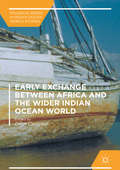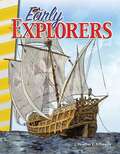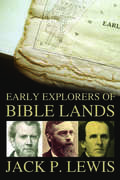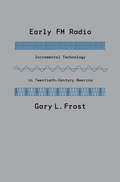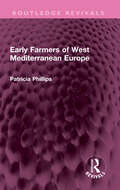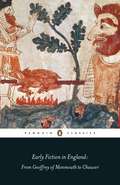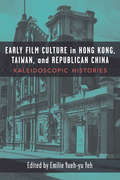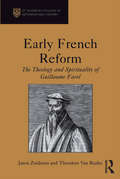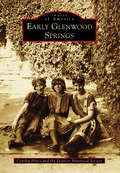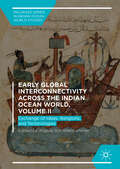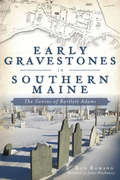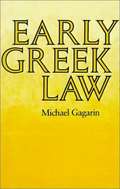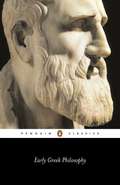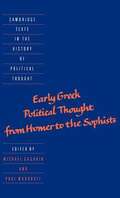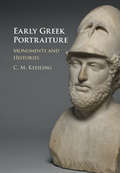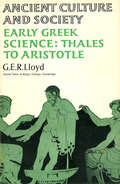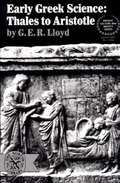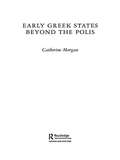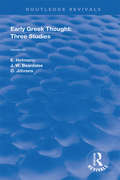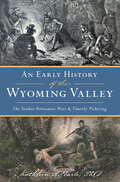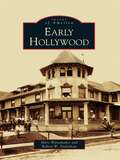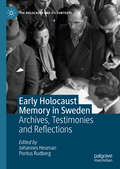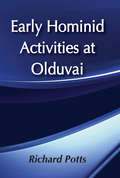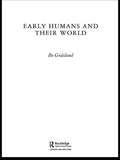- Table View
- List View
Early Exchange between Africa and the Wider Indian Ocean World (Palgrave Series in Indian Ocean World Studies)
by Gwyn CampbellThis volume comprises a selection of essays by scholars from a variety of disciplines that discuss the exchange relationship between Africa and the wider Indian Ocean world (IOW), a macro-region running from East Africa to China, from early times to about 1300 CE. The rationale for regarding this macro-region as a “world” is the central significance of the monsoon system which facilitated the early emergence of long-distance trans-IOW maritime exchange of commodities, peoples, plants, animals, technologies and ideas.
Early Explorers (Social Studies: Informational Text Series)
by Heather E. SchwartzBuild literacy skills and social studies content knowledge with the Early The Primary Source Readers series will ignite students' interest in history through the use of intriguing primary sources. This nonfiction reader features purposefully leveled text to increase comprehension for different learner types. Early Explorers teaches students about the fascinating explorers who mapped the world including the Vikings, Marco Polo, and Christopher Columbus. Text features include captions, a glossary, and an index to help build academic vocabulary and increase reading comprehension and literacy. This book prepares students for college and career readiness and aligns with state standards including NCSS/C3, McREL, and WIDA/TESOL.
Early Explorers of Bible Lands
by Jack P. LewisAcclaimed scholar and professor Jack Lewis narrates the lives and contributions of a number of nineteenth-century explorers of Bible lands whose work set the stage for modern biblical archaeology. Here are the stories of John Lewis Burckhardt, William Francis Lynch, James T. Barclay, Selah Merrill, and other explorers of Bible lands from the mid- to late-nineteenth century. Most of these men did not engage in archaeology as we commonly define it today, but their contributions set the stage for modern archaeology. They were not excavators, but students of geography, nature, languages, customs, traditions, and the Bible--all of which are vital to a more refined understanding of the Bible.As they traversed Palestine, these explorers encountered inscriptions and even previously unidentified languages (e.g., Hittite). Lewis's accounts reveal their interests, almost presciently, in the categories of anthropology as currently defined--cultural anthropology, physical anthropology, linguistics, and archaeology. These pursuits laid the groundwork for the more comprehensive and interdisciplinary studies that have eventually become the trademark of both biblical studies and the archaeology of the biblical world. As Lewis shows, we owe explorers a great debt of gratitude for their pioneering work.
Early FM Radio: Incremental Technology in Twentieth-Century America
by Gary L. FrostThe commonly accepted history of FM radio is one of the twentieth century’s iconic sagas of invention, heroism, and tragedy. Edwin Howard Armstrong created a system of wideband frequency-modulation radio in 1933. The Radio Corporation of America (RCA), convinced that Armstrong’s system threatened its AM empire, failed to develop the new technology and refused to pay Armstrong royalties. Armstrong sued the company at great personal cost. He died despondent, exhausted, and broke. But this account, according to Gary L. Frost, ignores the contributions of scores of other individuals who were involved in the decades-long struggle to realize the potential of FM radio. The first scholar to fully examine recently uncovered evidence from the Armstrong v. RCA lawsuit, Frost offers a thorough revision of the FM story. Frost’s balanced, contextualized approach provides a much-needed corrective to previous accounts. Navigating deftly through the details of a complicated story, he examines the motivations and interactions of the three communities most intimately involved in the development of the technology—Progressive-era amateur radio operators, RCA and Westinghouse engineers, and early FM broadcasters. In the process, Frost demonstrates the tension between competition and collaboration that goes hand in hand with the emergence and refinement of new technologies. Frost's study reconsiders both the social construction of FM radio and the process of technological evolution. Historians of technology, communication, and media will welcome this important reexamination of the canonic story of early FM radio.
Early Farmers of West Mediterranean Europe (Routledge Revivals)
by Patricia PhillipsOriginally published in 1975, this book traces the subsistence methods of Mediterranean country dwellers from the mid-seventh millennium B. C. (in radio-carbon year) to the beginning of the Bronze Age. It illustrates the change from Mesolithic to Neolithic cultures over a wide area: (South of France, Italy, Corsica, Sardinia and Spain). The book explores the human societies that lived through this important period of change and adaptation. From their density of settlement, site locations and material culture, hypotheses can be made as to population size and structure. There are sufficient clues in the archaeological record to make possible very cogent comparisons between the hunter-gatherers of the pre-pottery era in West Mediterranean Europe and their distant descendants on the eve of the Bronze Age. How these changes came about, and their effect on Neolithic people as individuals and members of human society form the central part of the book.
Early Fiction in England: From Geoffrey of Monmouth to Chaucer
by Laura AsheA brilliant new anthology that shows how fiction was reinvented in the twelfth century after an absence of hundreds of years. Essential for all students of medieval literature, Early Fiction in England includes extracts by Geoffrey of Monmouth, Wace, Marie de France, Chaucer and many others, in new translations and with illuminating introductions. Before the twelfth century, fiction had completely disappeared in Europe. In this important and provocative book, Laura Ashe shows how English writers brought it back, composing new tales about King Arthur, his knights and other heroes and heroines in Latin, French and English. Why did fiction disappear, and why did it come to life again to establish itself the dominant form of literature ever since? And what do we even mean by the term 'fiction'? Gathering extracts from the most important texts of the period by Wace, Marie de France, Chaucer and others, this volume offers an absorbing and surprising introduction to the earliest fiction in England.The anthology includes a general introduction by Laura Ashe, introductions to each extract, explanatory notes and other useful editorial materials. All French and Latin texts have been newly translated, while Middle English texts include helpful glosses.Laura Ashe is a University Lecturer in English and Fellow of Worcester College, Oxford. Her first book Fiction and History in England, 1066-1200 (Cambridge University Press, 2007) has been followed by numerous articles and edited collections; she is now writing the newOxford English Literary History vol. 1: 1000-1350 (Oxford University Press).
Early Film Culture in Hong Kong, Taiwan, and Republican China: Kaleidoscopic Histories
by Emilie Yueh-yu YehThis volume features new work on cinema in early twentieth-century Hong Kong, Taiwan, and Republican China. Looking beyond relatively well-studied cities like Shanghai, these essays foreground cinema’s relationship with imperialism and colonialism and emphasize the rapid development of cinema as a sociocultural institution. These essays examine where films were screened; how cinema-going as a social activity adapted from and integrated with existing social norms and practices; the extent to which Cantonese opera and other regional performance traditions were models for the development of cinematic conventions; the role foreign films played in the development of cinema as an industry in the Republican era; and much more.
Early French Reform: The Theology and Spirituality of Guillaume Farel (St Andrews Studies In Reformation History Ser.)
by Jason Zuidema Theodore Van RaalteReminding us that the Genevan Reformation does not begin and end with John Calvin, this book provides an introduction to Guillaume Farel (1489-1565), one of several important yet often overlooked French-speaking reformers. Born in 1489 near Gap, France, Farel was an important first-generation French-speaking Reformer and one of the most influential early leaders of the Reform movement in what is now French-speaking Switzerland. Educated in Paris, he slowly began to question Catholic orthodoxy, and by the 1520s was an active protestant preacher, resulting in his exile to Switzerland. Part of Farel's aggressive work in this area brought him to Geneva several times, where in 1535 and 1536 he secured votes in favour of the Reform, and later in 1536 persuaded the young theologian John Calvin to stay. Farel also penned Geneva's confession of faith of that year and their ecclesiastical articles of the next. As such, this volume underlines the fact that Calvin entered the reform movement in Geneva in a situation in which Farel had been already deeply involved. To better understand that situation, the book is divided into two parts. The first provides a rich and nuanced portrait of Farel's early thought by way of interpretive essays; the second section offers translations of a number of Farel's key texts. These translations include some of the first widely-accessible full-length translations of Farel's work into English. Offering both a scholarly overview of Farel and his life, and access to his own words, this book demonstrates the importance of Farel to the Reformation. It will be welcomed not only by scholars engaged in research on French reform movements, but also by students of history, theology, or literature wishing to read some of the earliest theological texts originally written in French.
Early Glenwood Springs
by Cynthia Hines Frontier Historical SocietyOriginally planned as the town of Defiance, Glenwood Springs was renamed for its natural hot springs along the banks of the Colorado River and for Glenwood, Iowa, the hometown of Isaac Cooper. In the early 1880s, Cooper had the vision of a spa resort here but not the finances to turn his dream into a reality. He sold out to Walter Devereux and his investors, who saw the construction of the Hot Springs Pool, Hotel Colorado, and Vapor Caves completed. Once railroads arrived in 1887, Glenwood Springs became a playground for wealthy travelers who sought out the hot springs as well as other recreational opportunities, such as hunting, fishing, hiking, and horseback riding. With beautiful scenery, caves to explore, and community festivals, visitors today sustain Glenwood's economy. Located at the confluence of the Colorado and Roaring Fork Rivers, our community has also served as a retail hub for the surrounding area from the 1880s to the present.
Early Global Interconnectivity across the Indian Ocean World, Volume II: Exchange of Ideas, Religions, and Technologies (Palgrave Series in Indian Ocean World Studies)
by Angela SchottenhammerThis volume investigates the emergence and spread of maritime commerce and interconnectivity across the Indian Ocean World—the world’s first “global economy”—from a longue durée perspective. Spanning from antiquity to the nineteenth century, these essays move beyond the usual focus on geographical sub-regions or thematic aspects to foreground inter- and trans-regional connections. Focusing on the role of religion in the expansion of commerce and exchange across the region, as well as on technology and knowledge transfer, volume II covers shipbuilding and navigation technologies, porcelain production, medicinal knowledge, and mules as a commodity and means of transportation.
Early Gravestones in Southern Maine: The Genius of Bartlett Adams
by Ron Romano James BlachowiczThe slate gravestones of southern Maine bear evidence to the region's fascinating history, from shipwrecks and famous wartime sea captains to countless ordinary citizens. Master stone-cutter Bartlett Adams memorialized the tragedy and triumph of the region in nearly two thousand gravestones. Examine the artistry of the headstones that mark the resting places of three generations of the same family who all went down with the schooner Charles, and discover the grief that Adams poured into the stones for his own three children. Through deep and original research, author and guide Ron Romano narrates the early history of southern Maine and one man's legacy, carved in stone.
Early Greece (Second Edition)
by Oswyn MurrayHighly readable account of Greece prior to and during the War with Carthage.
Early Greek Law
by Michael GagarinDrawing on the evidence of anthropology as well as ancient literature and inscriptions, Gagarin examines the emergence of law in Greece from the 8th through the 6th centuries B.C., that is, from the oral culture of Homer and Hesiod to the written enactment of codes of law in most major cities.
Early Greek Philosophy (Penguin Classics)
by Jonathan BarnesThe works collected in this volume form the true foundation of Western philosophy - the base upon which Plato and Aristotle and their successors would eventually build. Yet the importance of the Pre-Socratics thinkers lies less in their influence - great though that was - than in their astonishing intellectual ambition and imaginative reach. Zeno's dizzying 'proofs' that motion is impossible; the extraordinary atomic theories of Democritus; the haunting and enigmatic epigrams of Heraclitus; and the maxims of Alcmaeon: fragmentary as they often are, the thoughts of these philosophers seem strikingly modern in their concern to forge a truly scientific vocabulary and way of reasoning.
Early Greek Political Thought from Homer to the Sophists
by Michael Gagarin Paul WoodruffThis edition of early Greek writings on social and political issues includes works by more than thirty authors, including the sophists, poets, tragedians, historians, medical writers and pre=Socratic philosophers. Besides political theory, ancient political thought includes early sociology, anthropology, ethics and rhetoric, and the wide range of issues discussed includes the origin of human society, the origin of law, the nature of justice, the forms of good government, and the distribution of power among genders and social classes.
Early Greek Portraiture: Monuments and Histories
by Keesling Catherine M.In this book, Catherine M. Keesling lends new insight into the origins of civic honorific portraits that emerged at the end of the fifth century BC in ancient Greece. Surveying the subjects, motives and display contexts of Archaic and Classical portrait sculpture, she demonstrates that the phenomenon of portrait representation in Greek culture is complex and without a single, unifying history. Bringing a multi-disciplinary approach to the topic, Keesling grounds her study in contemporary texts such as Herodotus' Histories and situates portrait representation within the context of contemporary debates about the nature of arete (excellence), the value of historical commemoration and the relationship between the human individual and the gods and heroes. She argues that often the goal of Classical portraiture was to link the individual to divine or heroic models. Offering an overview of the role of portraits in Archaic and Classical Greece, her study includes local histories of the development of Greek portraiture in sanctuaries such as Olympia, Delphi and the Athenian Acropolis.
Early Greek Science: Thales to Aristotle
by Dr G E LloydIn this new series leading classical scholars interpret afresh the ancient world for the modern reader. They stress those questions and institutions that most concern us today: the interplay between economic factors and politics, the struggle to find a balance between the state and the individual, the role of the intellectual. Most of the books in this series centre on the great focal periods, those of great literature and art: the world of Herodotus and the tragedians, Plato and Aristotle, Cicero and Caesar, Virgil, Horace and Tacitus.This study traces Greek science through the work of the Pythagoreans, the Presocratic natural philosophers, the Hippocratic writers, Plato, the fourth-century B.C. astronomers and Aristotle. G. E. R. Lloyd also investigates the relationships between science and philosophy and science and medicine; he discusses the social and economic setting of Greek science; he analyses the motives and incentives of the different groups of writers.
Early Greek Science: Thales to Aristotle (Ancient Culture and Society)
by G. E. R. LloydG. E. R. Lloyd also investigates the relationships between science and philosophy and science and medicine; he discusses the social and economic setting of early Greek science; and he analyzes the motives and incentives of the different groups of writers.
Early Greek States Beyond the Polis
by Catherine MorganClear and direct in style, and with more than eighty photographs, maps and plans, Early Greek States Beyond the Polis is a widely relevant study of Greek history, archaeology and society. Catherine Morgan addresses the different forms of association experienced by early Iron-Age and Archaic Greeks by exploring the archaeological, literary and epigraphical records of central Greece and the northern Peloponnese. Giving an unprecedented understanding of the connections between polis identity and other forms and tiers of association, and refuting the traditional view of early Greek 'ethnic' groups (ethne) as simple systems based on primitive tribal ties, students will find this an essential text in the study of Greek history.
Early Greek Thought: Three Studies (Routledge Revivals)
by E. Hofmann J. W. Beardslee O. JohrensOriginally compiled and published in 1922, this volume contains three studies on Early Greek Thought: E. Hofmann's Qua Ratione; J. W. Beardslee's Fifth-Century Greek Literature; and O. JOhrens's Die Fragmente des Anaxagoras.
Early History of the Wyoming Valley, An: The Yankee-Pennamite Wars & Timothy Pickering
by Kathleen A. EarleWhen Connecticut Yankees began to settle the Wyoming Valley in the 1760s, both the local Pennsylvanians and the powerful native Haudenosaunee (Iroquois) strenuously objected. The Connecticut Colony and William Penn had been granted the same land by King Charles II of England, resulting in the instigation of the Yankee-Pennamite Wars. In 1788, during ongoing conflict, a band of young Yankee ruffians abducted Pennsylvania official Timothy Pickering, holding him hostage for nineteen days. Some kidnappers were prosecuted, and several fled to New York's Finger Lakes as the political incident motivated state leaders to resolve the fighting. Bloody skirmishes, the American Revolution and the Sullivan campaign to destroy the Iroquois all formed the backdrop to the territorial dispute. Author Kathleen A. Earle covers the early history of colonial life, war and frontier justice in the Wyoming Valley.
Early Hollywood
by Marc Wanamaker Robert NudelmanThe image of Hollywood often translates as some otherworldly dreamscape filled with fantastic lives and fantasy fulfillment. The real deal was carved from the Southern California desert as an outpost northwest of Los Angeles. The movie industry arrived when tumbleweeds were not simply props and actual horsepower pulled the loads. Everyday workers, civic management, and Main Street conventionalities nurtured Hollywood's growth, as did a balmy climate that facilitated outdoor photography and shooting schedules for filmmakers. Splendid vintage photographs from the renowned collections of the Hollywood Heritage Museum and Bison Archives illustrate Hollywood's businesses, homes, and residents during the silent-film era and immediately after, as the Great Depression led up to World War II. These images celebrate Hollywood before and after its annexation into the city of Los Angeles in 1910 and its subsequent ascension as the world's greatest filmmaking center.
Early Holocaust Memory in Sweden: Archives, Testimonies and Reflections (The Holocaust and its Contexts)
by Pontus Rudberg Johannes HeumanThis book investigates the memory of the Holocaust in Sweden and concentrates on early initiatives to document and disseminate information about the genocide during the late 1940s until the early 1960s. As the first collection of testimonies and efforts to acknowledge the Holocaust contributed to historical research, judicial processes, public discussion, and commemorations in the universalistic Swedish welfare state, the chapters analyse how and in what ways the memory of the Holocaust began to take shape, showing the challenges and opportunities that were faced in addressing the traumatic experiences of a minority. In Sweden, the Jewish trauma could be linked to positive rescue actions instead of disturbing politics of collaboration, suggesting that the Holocaust memory was less controversial than in several European nations following the war. This book seeks to understand how and in what ways the memory of the Holocaust began to take shape in the developing Swedish welfare state and emphasises the role of transnational Jewish networks for the developing Holocaust memory in Sweden.
Early Hominid Activities at Olduvai: Foundations of Human Behaviour
by Richard PottsThe earliest sites at Olduvai Gorge in Tanzania are among the best documented and most important for studies of human evolution. This book investigates the behavior of hominids at Olduvai using data of stone tools and animal bones, as well as the results of work in taphonomy (how animals become fossils), the behavior of mammals, and a wide range of ecological theory and data. By illustrating the ways in which modern and prehistoric evidence is used in making interpretations, the author guides the reader through the geological, ecological, and archeological areas involved in the study of humans.Based on his study of the Olduvai excavations, animal life, and stone tools, the author carefully examines conventional views and proposals about the early Olduvai sites. First, the evidence of site geology, tool cut marks, and other clues to the formation of the Olduvai sites are explored. On this basis, the large mammal communities in which early hominids lived are investigated, using methods which compare sites produced mainly by hominids with others made by carnivores. Questions about hominid hunting, scavenging, and the importance of eating meat are then scrutinized. The leading alternative positions on each issue are discussed, providing a basis for understanding some of the most contentious debates in paleo-anthropology today.The dominant interpretive model for the artifact and bone accumulations at Olduvai and other Plio-Pleistocene sites has been that they represent home bases, social foci similar to the campsites of hunter-gatherers. Based on paleo-ecological evidence and ecological models, the author critically analyzes the home base interpretation and proposes alternative views. A new view of the Olduvai sites - that they represent stone caches where hominids processed carcasses for food - is shown to have important implications for our understanding of hominid social behavior and evolution.
Early Humans and Their World
by Bo GräslundSummarizing modern research on early hominid evolution from the apes six million years ago to the emergence of modern humans, this book is the first to present a synthetic discussion of many aspects of early human life.
